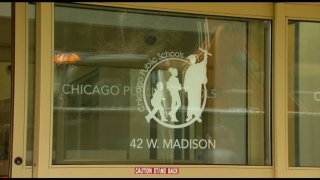
Chicago Public School teachers and school support staff will get the same 12 weeks of paid parental leave already provided to all 32,000 city employees, thanks to an agreement that Mayor Brandon Johnson forged with the Chicago Teachers Union he once served.
Five months ago, the CTU accused former Mayor Lori Lightfoot of stepping in to rescind a promise by her hand-picked school leadership to give CPS employees the parental leave benefit.
It was a new chapter in the long, bitter battle between Lightfoot and the CTU that included an 11-day strike in 2019 and two job actions during the COVID-19 pandemic.
Hours after the CTU delivered 3,000 signatures to City Hall, Lightfoot branded the allegation that she reversed the parental leave promise “fundamentally not true.”
Feeling out of the loop? We'll catch you up on the Chicago news you need to know. Sign up for the weekly Chicago Catch-Up newsletter here.
“I’m the mayor who said, ‘This is a really good idea. That we should get it done.’ And we got it done for the city. What sense would it make for me to then say, ‘But I want to deny it to every other person outside of the city of Chicago government proper’? That doesn’t make any sense. Think of the logic and the absurdity of that,” Lightfoot said on that day.
“I want this to be a policy of not only the city of Chicago but of sister agencies. But it has to be done through the collective bargaining process.”
No matter what the roadblock was under Lightfoot, Johnson has now removed that impediment.
Local
It’s a quick and easy way for the new mayor to start delivering for the unions whose campaign contributions and foot soldiers helped put him in office.
During a City Hall news conference, Johnson called the new policy a “very bold step” and a “huge win for CPS employees.” It will allow new parents to deliver for their students, but also “show up for their own families during a critical time in their lives.”
No longer will they need to “choose between a paycheck and starting a family,” the mayor said.
To match the city policy, the CPS expansion to 12 weeks of paid leave will apply to those “growing their family by birth, adoption or foster care, as well as those acting as a surrogate.”
To qualify for full pay for 12 weeks of leave, CPS employees must work for the school system for at least one year before the parental leave begins and have worked at least 1,250 hours during those 12 months. The federal Family Medical Leave Act has similar eligibility requirements.
Chicago Teachers Union President Stacy Davis Gates was a featured speaker at Thursday’s City Hall news conference. In fact, the mayor’s office took pains to put out a revised public schedule that included her name.
That favored-nation status was a marked contrast from the cold shoulder Davis Gates got over the last four years, including when she was stopped at a City Hall elevator by the mayor’s security team and barred from participating in the final round of negotiations that ended the 11-day teachers strike.
“To say that I’m almost speechless by this moment is an understatement,” Davis Gates said.
Davis Gates recalled the “hardship” she was forced to undergo “to be a mom.” The mother of three said she had to beg her parents for help just to pay her bills.
“This means a lot to me personally and to our union. This policy makes sense. It should never be at the negotiating table. It should be the norm for every woman” in the workplace,, she said. “We talk about recruiting and retaining quality educators—this is a step in the right direction.”
Parental leave is a deeply emotional issue for Davis Gates.
In a January letter, she appealed to Lightfoot “as a mother, woman and educator” about an issue “close to my heart and the hearts of thousands of women” who comprise “80 percent” of CPS educators.
She recalled the hardships of her own first pregnancy because of an inadequate leave policy that currently grants parents “one-to-two weeks of paid leave, unless they are eligible for short-term disability.”
“We plan our pregnancies around our school calendars. We come to work sick because we cannot afford to squander sick days on being sick because we need them for parental leave,” Davis Gates wrote.
“When I had my first two children, I had to avoid sickness and personal misfortunate to ensure I had enough paid time off to sustain household,” she stated.



